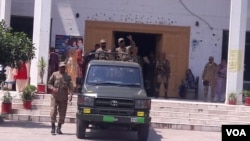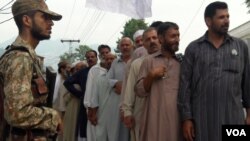Pakistan’s ruling PML-N party was leading the way in legislative elections held Thursday under heavy security in Pakistan-administered Kashmir. Official results were expected Friday morning.
Kashmir is a disputed region between South Asian rivals India and Pakistan. Both countries administer parts of the region but claim the whole region as their rightful territory, while some Kashmiris demand independence from both.
There were 423 candidates from 26 parties vying for the 41 contested seats. The winning candidates will later elect the remaining members of the assembly, which consists of 49 seats in all.
Pakistan’s three big political parties, Prime Minister Nawaz Sharif’s PML-N, slain former Prime Minister Benazir Bhutto’s PPP, and cricketer-turned-politician Imran Khan’s PTI, ran aggressive election campaigns.
A nationalist party, the Jammu and Kashmir Liberation Front, or JKLF, which is demanding independence from both India and Pakistan, boycotted the elections because of a law that requires candidates to sign a document expressing support for Kashmir’s accession to Pakistan.
A few other nationalist parties decided to sign the document for the first time so they could participate in the elections, but they continued to demand an independent Kashmir in their campaigns.
Toqeer Gilani, president of JKLF, said it was illegal for Pakistan’s political parties to campaign in Kashmir under a U.N. Security Council resolution on Kashmir.
The nonbinding U.N. resolution lists Kashmir as a disputed territory and demands that both India and Pakistan withdraw their armies from the region and hold a plebiscite allowing the people of Kashmir to decide whether they want to accede to either country or remain independent.
Special status
In order to maintain Kashmir’s status as a disputed territory, Pakistan has given it semiautonomous status, with its own constitution, national flag, president and prime minister, and its own Supreme Court. However, a body known as the Azad Jammu and Kashmir Council, with the Pakistani prime minister as its chairman, functions as an administrative bridge between the two.
Pakistan’s government deployed more than 20,000 military members and almost 10,000 police to work alongside thousands of local officers to keep the elections free of violence and transparent.
The current election results were following previous patterns in which the party that held power in Islamabad won in Pakistan-controlled Kashmir as well.
In an interesting episode of outside influence on these elections, many of the contestants, including the local heads of the three big political parties, came from the Mirpur, Kotli and Bhimber districts and were funded by Kashmiri expatriates living in Britain. One million people from Mirpur and surrounding areas live in Britain.
The elections in Pakistan-controlled Kashmir came as the Indian side of the disputed region has been experiencing a fresh wave of violence.
Some of the largest street protests in years broke out after Indian security forces killed a 22-year-old separatist leader July 8. Burhan Wani had become a social media sensation among disgruntled Kashmiri youths.
Dozens of people have been killed since then in clashes between security forces and stone-throwing youths.
VOA's Ayesha Tanzeem contributed to this report from Islamabad.





